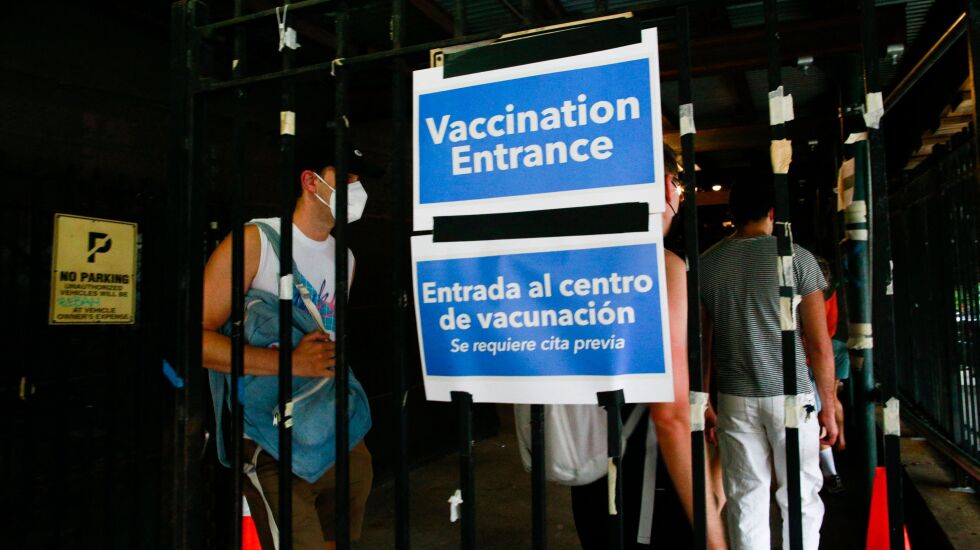
Monkeypox cases — a majority of them reported among gay and bisexual men — reached 208 in Illinois and more than 2,323 nationwide this week. Public health experts are now struggling to mitigate the spread of the virus and are frustrated with managing supply and demand for the vaccine.
In Chicago, cases increased from 105 last week to more than 180 on Thursday. Worry among the affected community is clear: A line at the Test Positive Aware Network (TPAN) service center in Edgewater stretched for nearly a block on Monday. Dozens lined up hours before the 2 p.m. start time for vaccination, but with only 100 doses available at that location and priority going to high-risk individuals, many were turned away.
“I could not believe the line outside, which shows how urgent this is and how afraid people are, and it makes me sick that we have so few doses of the vaccine to offer people,” TPAN CEO Kara Eastman told ABC-7 Chicago.
The demand for the monkeypox (MPV) vaccine shows that people are willing to take precautions to avoid the virus. That’s encouraging, after so much hesitancy from some regarding the COVID-19 vaccines. Once more vaccines are available, a swift and efficient rollout is imperative.
The time to take the outbreak seriously is now, as Gov. J.B. Pritzker made clear on Thursday when he called on the federal government to be more aggressive in taking action against the virus and to put more priority on areas with the most significant outbreaks, like Chicago, when it comes to allocating vaccine doses. Illinois now has the third-highest total of monkeypox cases in the country.
“We know that a swift response is essential when confronting outbreaks of disease,” said Pritzker. “And we’ve learned in the last few years that most people are eager to protect themselves and their communities when given the tools to do so.”
High demand, low supply
The federal government has ordered 7 million doses of the vaccine, but a majority of the doses won’t be available until mid-2023. Only 156,000 have shipped nationally, according to the U.S. Department of Health and Human Services.
Chicago has received over 5,400 doses of vaccine, according to an update from the Chicago Department of Public Health, and the city expects to receive an additional 15,000 doses in the coming days.
Because vaccine supply is limited, CDPH says it will take some time before health care providers are able to provide vaccines to the general public. For now, in order to effectively slow down community transmission, the focus is to vaccinate those who are at high risk of being exposed.
Those at high risk include men who have sex with other men, transgender women who have sex with men, sex professionals and people who have multiple sex partners. Similar to COVID-19, MPV vaccination requires two shots, so individuals must return for a second injection four weeks after the first.
As the government speeds up vaccine supply, another way to mitigate the spread of the virus is through aggressive educational outreach at the local and federal level. Although the virus has been around for decades, most people aren’t knowledgable about its symptoms or how it spreads from person to person.
The monkeypox disease can last between two to four weeks. Symptoms include fever, swollen lymph nodes and blister-like rashes that look like chickenpox. The rashes may begin to appear on the face and later spread to other parts of the body. If the virus is acquired through intimate or sexual contact, the rashes may begin in the genital or anal areas.
Health experts have stressed that MPV is not a sexually transmitted disease, though the most reported form of transmission occurs through skin-to-skin contact. A majority of reported cases have been among men who are intimate with other men — but anyone can contract the virus, regardless of sex or gender.
CDPH said it has engaged diverse partners to bring vaccines to those who are eligible through health care providers. The city plans to continue to raise awareness through weekly engagement with LGBTQ partners, businesses and at summer events.
As MPV cases go up, vaccines will be needed sooner rather than later. In the meantime, the public should take advantage of a current line of defense that’s readily available — getting tested. It’s the best way to keep safe and stop this virus, now.
The Sun-Times welcomes letters to the editor and op-eds. See our guidelines.







